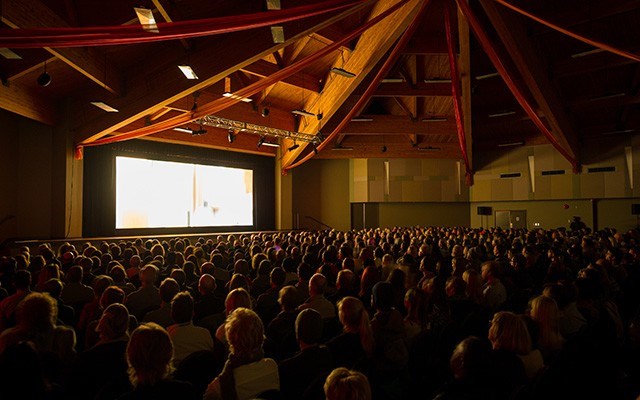When I was young — say, around 40 — I came to see Whistler as a magical place. There were dozens of reasons why, but the most germane — those that contributed most to my decision to move here — were the unmatched mountains and snow, the youthful energy of the town, its litany of dreamers and do-ers, the creative community of filmers, photographers and athletes, and the artistic and cultural activity that permeated events.
In particular, I remember a late-90s iteration of the (ill-fated) HSBC Whistler WinterStart Festival, which in addition to featuring a World Cup Freestyle event, offered a parade, live music, and an interesting new film showcase. Being a regular film-fest goer back home in Toronto, I was more than happy for an excuse to balance stormy days on the slopes with quiet time in the dark watching obscure Canadian films (ever heard of The Grizzly Project?). This is cool, I remember thinking: two of my favourite things — I'm in the mountains... and I'm watching films!
Twenty years later I still think that, which is why I can't wait for the Whistler Film Festival (WFF) each fall. If you haven't taken advantage of the unrivalled opportunity this annual event brings us to view world, Canadian and Western Canadian premieres, or the chance to sit in on cool industry sessions and meet some of the best talent in the Canadian and global film industries, you're missing out. And if you have, well, you know what I'm talking about.
Founded in 2001, the stated intent of the Whistler Film Festival was not only to put Whistler on the map as a cultural destination while promoting B.C.'s burgeoning film industry, but also to create opportunities for new and original voices in independent film. That purpose remains, but the festival's scope and scale have blossomed beyond what anyone could have imagined. Today's WFF has serious street cred on the international film-fest circuit, augmented by market-driven programs for Canadian talent. It sees over 16,000 attendees at its events annually, all happy to back a vision of making Whistler the essential destination to advance and connect the art and business of film. From a volunteer-driven organization with $30,000 in pocket change to a cultural juggernaut with an annual budget of some $1.5 million, the WFF's impact has been significant: over the past 16 years, it has presented 1,017 films, handed out 112 awards, attracted and launched some of the era's top talent, and established a community of 1,850 filmmaker and industry alumni.
While Shauna Hardy Mishaw and her rock-star crew don't need any pats on the back for this marvellous achievement, they do welcome your continued support to make it a true community event. This year's theme is a fitting "it takes a village" (#WFF17 #ittakesavillage), which pairs with the launch of a "Be a Canadian Film Hero" Indiegogo campaign to raise $150,000 for script-to-screen development programs for Canadian filmmakers and women in film. And you can look forward to 87 fresh films in several categories (pick up a preview guide anywhere in town) along with the usual industry sessions, live music and other events.
But I digress, because my real intent here is to plumb the clear connection between mountains and film. It certainly makes sense that celebrations dedicated to mountain and adventure films have found a place in mountain towns. Started in 1979, for instance, Telluride Mountainfilm is one of the longest-running, while the Banff Mountain Film Festival is the largest, most iconic, and most comprehensive.
But mountain towns also seem to hold an outsize number of international film festivals — as if everyone in LA needs an excuse to leave town, or that black clothing looks better with a snowy backdrop. And Colorado hosts the lion's share. There's the Boulder International Film Festival in March, with a reputation as one of the most influential young film festivals in the country. Also in March, the Durango Independent Film Festival, as old as the WFF, has also racked up indie cred. The Telluride Film Festival may be that town's "second" filmfest for mountain peeps, but the Labour Day weekend ritual competes with Venice for world premieres and Oscar contenders, with a place in history for first screenings of films like My Dinner with Andre, Twin Peaks and The Crying Game. The Breckenridge Film Festival, 36 years strong, is associated with the Film Studies Program at the University of Colorado. Following the town's tradition of big names and big fur, the Aspen Filmfest includes major productions, Oscar hopefuls, and lavish benefits. Hell, Vail even has a film festival, staged annually by the Colorado Film Institute as its primary outlet for fostering independent film. And then there's the granddaddy — the Sundance Film Festival, a program of the Sundance Institute that takes place each January in Park City, Utah, and sees almost 50,000 attendees — the largest independent film festival in the United States.
It's hard to say why mountain towns appeal to filmmakers, actors and industry types, but I'm guessing that it's their creative crucible — the very same thing that once made Whistler seem so magic to me — which has something to do with it.
Leslie Anthony is a Whistler-based author, biologist and bon vivant who has never met a mountain he didn't like.




